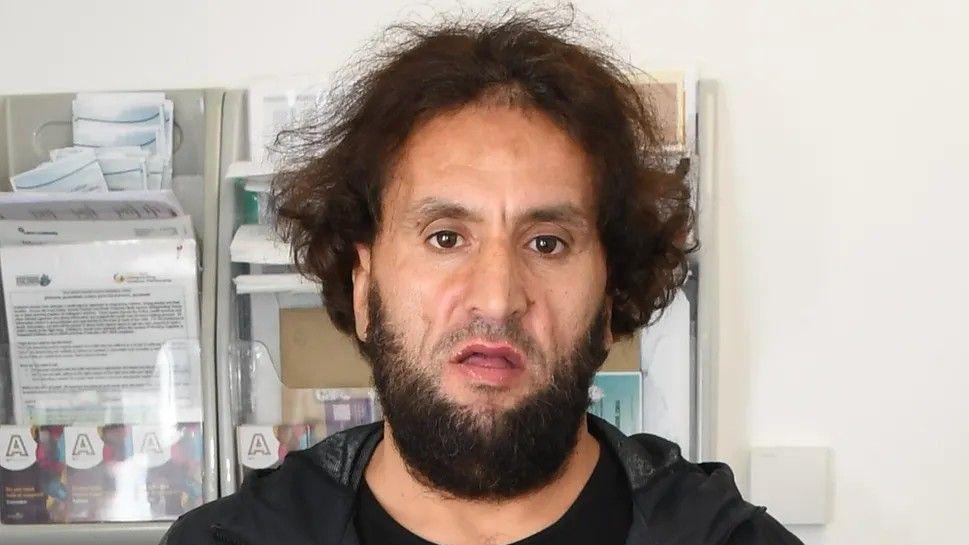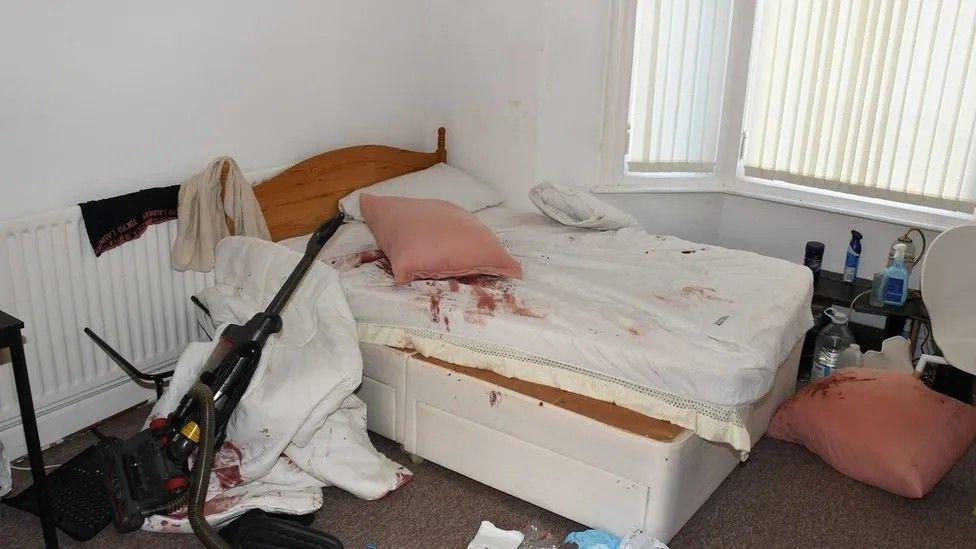Street killing of pensioner 'terrorist act' - judge
Moroccan asylum seeker Ahmed Alid was jailed for life with a minimum term of 45 years
- Published
A man who stabbed a stranger to death in an attack described by a judge as a terrorist act has been jailed for life.
Moroccan asylum seeker Ahmed Alid, 45, roamed the streets in Hartlepool looking for a victim to attack in "revenge" for the Israel-Hamas conflict in October, the judge told Teesside Crown Court.
He killed 70-year-old Terence Carney by stabbing him multiple times.
Sentencing Alid for life on Friday, external, the judge said the killer had "hoped to frighten the British people and undermine the freedoms they enjoy".
He was also found guilty of the attempted murder of his housemate, Javed Nouri.
WARNING: This article contains images which some readers may find distressing

Moroccan asylum seeker Ahmed Alid, 45, stabbed 70-year-old Terence Carney multiple times
Alid, who was described as following an extreme version of Islam by prosecutors, had told police the attacks were in protest against the Israel and Gaza conflict.
He spoke through an Arabic interpreter during the trial and had admitted stabbing the two men but denied he had intended to kill or cause really serious harm.
The judge, Mrs Justice Cheema-Grubb, said: "The murder of Terence Carney was a terrorist act in which you hoped to influence the British government.
"You intended it as revenge for the actions of a foreign country, Israel, and to intimidate and influence the British government in its international relations.
"You hoped to frighten the British people and undermine the freedoms they enjoy."
'No genuine remorse'
The judge said psychiatric reports had found no evidence of psychosis "or any other serious mental illness" in Alid.
She said he was deemed to have a "minor mental illness" called an adjustment disorder which would have affected his judgment but this offered "very limited mitigation" as it was not sufficiently linked to "such a serious level of violence".
She told Alid he had shown "no genuine remorse or pity" for his victims.
Due to time spent on remand, he would have to serve 44 years and 52 days in prison, she said.
Killer extremist drifted round Europe for years
- Published28 April 2024
The court heard Alid forced his way into Mr Nouri's room in the early hours of 15 October and stabbed him.
Alid shouted "Allahu Akbar" - "God is great" - during the attack at the Home Office-approved asylum seekers' accommodation.
After that attack, Alid fled into the street and came across Mr Carney, who was out for a regular early morning walk on nearby Raby Road.

The court heard Alid forced his way into Mr Nouri's room and stabbed him
Mrs Justice Cheema-Grubb said Alid had waited to assault Mr Nouri when he was "asleep and vulnerable," and that "the life he had started to build in this country was shattered by what happened".
She said Alid then "attacked an unarmed and elderly man who was unable to defend himself".
Doorbell camera footage showed Mr Carney cry out "no, no" as he was stabbed by the stranger.
In a holding cell at Middlesbrough police station after his arrest, Alid launched into a speech in Arabic saying that "Allah willing, Gaza would return to be an Arab country" and how he would have continued his "raid" if his hands had not been injured.
Alid, who strongly disapproved of his housemate Mr Nouri's conversion to Christianity, said God was "displeased" with those who went astray.
During his police interview Alid said he launched his attacks because "Israel had killed innocent children".
Jonathan Sandiford KC, prosecuting, told the court during the trial: "In other words, he said he had committed the attempted murder of Javed Nouri and the murder of Mr Carney in revenge for what he believed to be the killing of children by Israel."
'I don't feel anything'
In a victim statement, Mr Carney’s wife Patricia Carney said she found it impossible to talk about her husband’s death and felt numb.
She said: "I don’t feel anything, I’ve lost everything.
"I don’t feel I can be happy anymore, I feel I’m constantly putting on an act and a brave face for my family.
Mrs Carney added: "He used to love going for an early morning walk. He thought he was safe, but a chance encounter ended his life."
She said she had been with Mr Carney from a young age and although they had been living separately for a few years, they were "still very much together".
Mrs Carney said she could no longer go into town because it was "too painful" to be near the spot where her husband was murdered.
Mr Nouri, 31, said that since the attack, he did not "trust anyone or anything" and "all thoughts and feelings I had of being in a safe country have gone".
His victim statement added: "I would expect to be arrested and killed in my home country for converting to Christianity but I did not expect to be attacked in my sleep here.
"How is it possible for someone to destroy someone's life because of his religion?"
Mr Nouri said he now struggled with mental health problems and had to move cities, losing all his friends.
"I want to tell Ahmed: You are a weak person, because of your religion you attack someone in deep sleep and an old man who struggled to walk," he added.
As the statements were read out in court, Alid sat in the dock with three security guards and repeatedly yawned.

Det Ch Supt James Dunkerley said Alid was not known to Terrorism Policing North East
Det Ch Supt James Dunkerley from Terrorism Policing North East (TPNE) described the attack as a "violent rampage".
"He was telling everybody on arrest, and in custody, what his intentions were – that he wanted to go out and kill more people,” he said.
"He was hell-bent on violence that day.
"His extremist views had fuelled him so much that he wanted to cause harm to anybody he could, in retribution to what he was seeing on his online media on events happening in Gaza."
Meanwhile a refugee organisation said sanctuary seekers in the area were "scared to go out" because they feared backlash against the attack.
Tees Valley of Sanctuary co-chair Shams Moussa said at the time, some refugees and asylum seekers deliberately did not go to things like appointments, food shops or volunteering commitments because they were "afraid they would be targeted".
Additional reporting by PA media.
Follow BBC Tees on X (formerly Twitter), external, Facebook, external and Instagram, external. Send your story ideas to northeastandcumbria@bbc.co.uk.